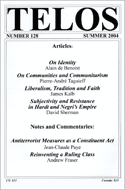On Tuesdays at the TELOSscope blog, we highlight a past Telos article whose critical insights continue to illuminate our thinking and challenge our assumptions. Today, Maxwell Woods looks at Alain de Benoist’s “On Identity,” from Telos 128 (Summer 2004).
 The demand for identity and the difficulty of answering the seemingly innocuous question “Who am I?” persists throughout the world in the material form of nationalism. The French government targets the Roma as an ethnic group for expulsion, the minister-president of Bavaria proclaims that foreign workers from other cultures are not needed, and recent Arizona legislation demands that all aliens in the state must carry registration documentation at all times—all, in their simplified forms, are broad statements of identity: I am French, Bavarian, American, etc. This renewed nationalist identity, which many assumed had died in the post-Nazi and postcolonial epoch, contradicts the prevailing multicultural ideology that has dominated Europe. Yet this reemergence of collective identities could be previewed in the very process of identity’s reconceptualization in modernity’s individualist ideology. Alain de Benoist’s article “On Identity” defines identity in a historical dialectic, and contends that the seemingly antithetical positions of the modern individual liberated from his past and the essentialist notion that humanity’s fate is determined from the start are in fact two sides of the same coin. We must cast aside these positions and begin to understand identity as a dynamic process of becoming wherein we freely choose who we are while, simultaneously, who we choose to be is limited by our objective reality.
The demand for identity and the difficulty of answering the seemingly innocuous question “Who am I?” persists throughout the world in the material form of nationalism. The French government targets the Roma as an ethnic group for expulsion, the minister-president of Bavaria proclaims that foreign workers from other cultures are not needed, and recent Arizona legislation demands that all aliens in the state must carry registration documentation at all times—all, in their simplified forms, are broad statements of identity: I am French, Bavarian, American, etc. This renewed nationalist identity, which many assumed had died in the post-Nazi and postcolonial epoch, contradicts the prevailing multicultural ideology that has dominated Europe. Yet this reemergence of collective identities could be previewed in the very process of identity’s reconceptualization in modernity’s individualist ideology. Alain de Benoist’s article “On Identity” defines identity in a historical dialectic, and contends that the seemingly antithetical positions of the modern individual liberated from his past and the essentialist notion that humanity’s fate is determined from the start are in fact two sides of the same coin. We must cast aside these positions and begin to understand identity as a dynamic process of becoming wherein we freely choose who we are while, simultaneously, who we choose to be is limited by our objective reality.
The changing definitions of identity throughout history exemplify the lack of a static and eternal classification of this concept. As a historical notion, identity does not emerge until after the Middle Ages, when all previous systems of thought dissolved. Thus, Benoist writes:
It is easy to understand why the question of identity appears, first, as a reaction to the dissolution of the social network and the disappearance of traditional points of reference brought about by modernity, and, second, in connection with the emergence of the notion of individual in the Western world. . . . There is a connection between the question of personal identity and the development of individualism. The latter has two different meanings: the value attributed to the individual within the group, and the intensity of the relationship of the person to himself.
But, this definition of identity within an individualist ideology ignores the social being of man. Modern liberalism propagates the theory of the completely free individual who is disengaged from society; however, men make choices based on a historical foundation that is already present. By choosing based on this limited freedom, we thus recognize objective reality in its restrictive capabilities and are also recognized by this same objective reality in which we exist—a reciprocity forming the foundation of identity. Through social interactions with the outside, we both construct our identity by recognizing and identifying with outside groups and maintain our existence by being recognized by these same outsiders. By realizing that our objective existence is limited by our physical world and previous experiences, and that we, as subjects different from others and distinct from the outside world, have the potential to change our environment, the definition of identity as determined and determining is destroyed. Identity is redefined as an act of becoming that “is not what never changes, but on the contrary, it is what allows one to constantly change without giving up who one is.”
Alain de Benoist’s radical theory of identity calls for the end of homogeneity and a return to a recognition of differences. We must renounce our liberal concepts of the free individual, as well as our essentialist determinisms, in favor of an identity of sociability that recognizes each subject as definitively different. We are not all equal nor can we be made equal by a brutal homogenizing force; rather, we must begin to recognize the other as essentially different and demand that we be recognized as different from the others. In liberalism, there is no recognition of ourselves; in nationalism and essentialism we violently mandate that others recognize us at their expense. We must eliminate these barbaric ideologies and begin an epoch of reciprocal recognition.
Read the full version of Alain de Benoist’s “On Identity” at the TELOS Online website. If you are affiliated with an institution that is an online subscriber to Telos, you have free access to our complete online archive. If not, you can purchase 24-hour access to this and other Telos articles at the low rate of $5/article.



